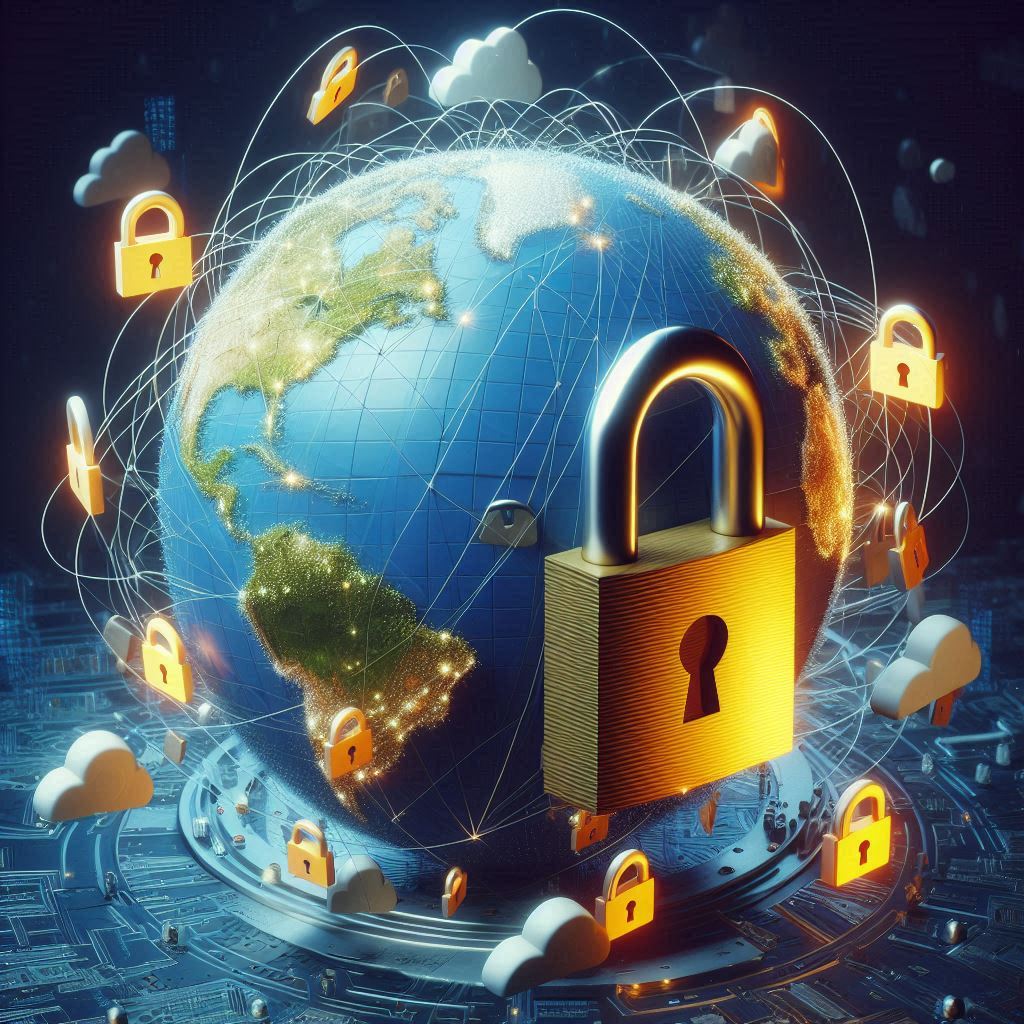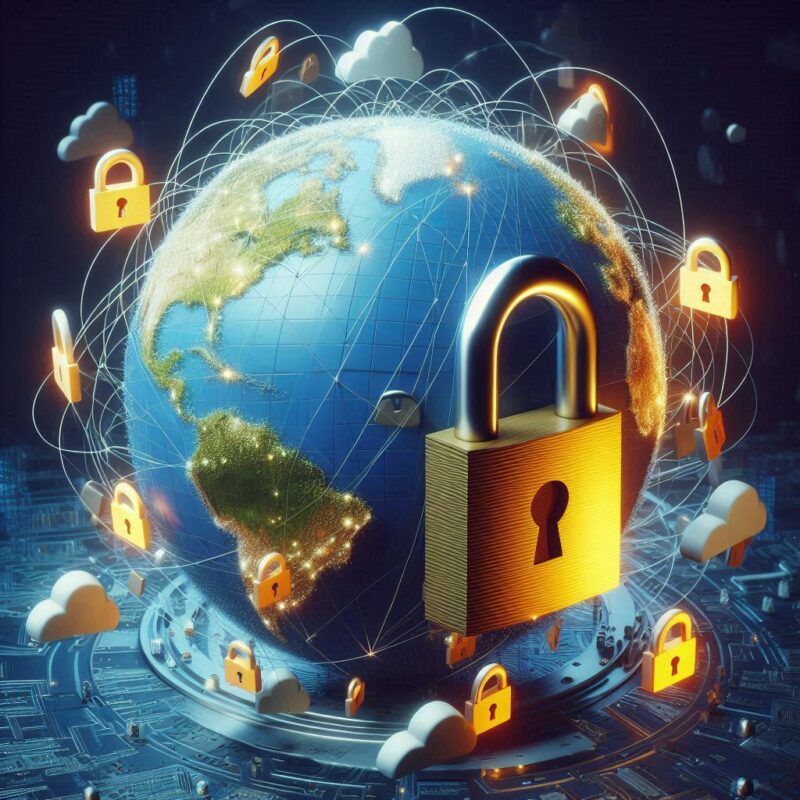May God have mercy on you
Hello, good time, dear users
What is a VPN and what is it used for?
In this article, we would like to explain to you what a VPN is, or in short, why it is banned in some regions and not in some regions, and what benefit it can have for us?
We even check with each other about the harms and problems it may cause to us and they say that this tool can provide our security, is this true or not!
First of all, let us check the history of this software from when and who made it or who created it, and even what was the use of this tool at the time of its initial appearance and what is its use for us now.
VPN history
With the beginning of the communications era, the expansion of the Internet at the national and international levels, and the emergence of the risks of using this powerful service, people gradually realized the shortcomings of this service and needed a cheap, economical service, and of course an easy solution.
This is what happened in the twenty-first century, when the Internet began, and many people suffered from security breaches and breaches on the Internet, and their information or systems were destroyed, and this was a big problem, and many companies and real people suffered from it.
So, at this time, major companies began to come up with ideas and solve this problem, and the solution they came up with was to use a method that could encrypt their private information, which gradually became known as VPN or Virtual Private Network. Found!
Now ciphers or protocols in general are gradually being found and different protocols have been created. One of the best protocols created at that time and the stormy beginning of VPN brought VPN to the virtual world which is the PPTP protocol which was developed in the year 1996 and its features were published in 1999. This protocol became popular especially in the Windows environment because most of the devices used at that time It was Windows and then Mac.
But despite the encryption processes, this protocol did not have strong encryption, but at the same time it was simple and fast, it increased the speed of the Internet and provided us with a certain increase in the security of using the network.
Little by little, over time and in less than a few years, another protocol called L2TP was found, which worked on the basis of IPsec, and this protocol had more and better security than its predecessor, PPTP.
This protocol has been in continuous operation for approximately 25 years and is considered a secure protocol in cyberspace.
But at that time another protocol called IKE was found, the first version of which was released in 1998, and its common name was IKEv1.
Due to the high security and strength of this protocol, as well as the very high speed it brought with it to the Internet, this protocol is known as one of the most powerful VPN protocols.
In the following years, this protocol was updated and became more popular and reached its second version, i.e. IKEv2, which today is known as one of the most widely used protocols in the world.
But then, in 2001, another protocol entered the field of competition, a protocol called OpenVPN, and this protocol had an open source, which made this protocol provide marketing for this protocol, and this protocol is considered one of the security protocols such as 256 – it supports the openSSL bit and increases the security Working with this rootkit.
Also, due to its open source, this protocol can be used for various devices such as mobile phones, computers, virtual servers, and it is even possible to use this protocol on routers and modems.
Of course, it should be noted that the other protocols presented have the ability to be implemented on devices such as routers, modems, set-top boxes, and even mobile phones and televisions.
Also in recent years, a project called Wireguard was launched in 2019. This protocol, which was a powerful and new protocol, was launched in 2020. It had very high security and speed, and this protocol spread in the world very quickly. Very high speed.
Introducing companies and people to develop protocols
PPTP
PPTP (Point-to-Point Tunneling Protocol) was developed by Microsoft in collaboration with several other companies in the early 1990s. This protocol is designed to create VPN (virtual private network) connections and allows users to communicate securely over the Internet.
L2TP
L2TP (Layer 2 Tunneling Protocol) is a tunneling protocol used to establish VPN connections. This protocol was developed in the mid-1990s in collaboration between Microsoft and Cisco Systems. L2TP can be used to send data over public and private networks and serves as a secure method for tunnel communications.
L2TP does not use encryption alone and is usually combined with other protocols such as IPsec to provide additional security. This security suite is known as L2TP/IPsec and is one of the most popular ways to create VPNs.
How1
IKEv1 (Internet Key Exchange Version 1) is a protocol designed to establish and manage the security of VPN connections through IPsec. IKEv1 is responsible for exchanging encryption keys and security settings between two parties (such as routers or VPN servers).
This protocol works in two main steps:
- Step 1: In this step, both parties create a secure channel for exchanging information. This step involves authentication and creating a secure channel for exchanging keys.
- Step 2: In this step, the actual encryption keys are generated and exchanged to transfer the data.
IKEv1 was widely used, but was gradually replaced by IKEv2, which features improvements in performance and security. IKEv2 includes features such as better handling of lost connections and stronger authentication capabilities.
IKEv2
IKEv2 (Internet Key Exchange version 2) is an enhanced version of IKEv1 designed to manage the security of VPN connections using IPsec. This protocol was published in 2005 as RFC 4306 and contains several improvements in performance, security, and management capabilities over its predecessor.
Key features of IKEv2:
- Optimal Performance: IKEv2 is more efficient and requires faster speed to establish secure connections.
- Support for mobility and multi-connection: This protocol allows mobile devices (such as mobile phones) to move between different networks without losing the VPN connection.
- Use stronger authentication: IKEv2 can support multiple authentication methods, including passwords, digital certificates, and Extensible Authentication Protocol (EAP)-based authentication.
- Better Connection Management: IKEv2 has better capabilities to manage and restore lost connections.
- Better Security: This protocol uses stronger algorithms and more modern security mechanisms by default.
For this reason, IKEv2 is one of the most popular protocols for creating VPNs, and many modern VPN services use it.
IKEv2 was developed by the Internet Engineering Task Force (IETF) and released as part of the IPsec standards in 2005. This protocol was particularly popularized by Microsoft and other companies in the field of networking and security and has been implemented in various operating systems including Windows, Linux, and iOS . Its main goal was to improve and improve the process of exchanging keys and creating secure connections in VPNs.
Open VPN
Open VPN
The OpenVPN protocol was developed by James Younan in 2001. This protocol was designed as an open source solution for creating secure VPN connections and uses SSL/TLS technologies to secure connections. OpenVPN has become one of the most popular protocols for creating virtual private networks due to its flexibility, high security, and comprehensive configurability.
WireGuard
WireGuard
WireGuard is a new open source VPN protocol developed by Jason A. Donenfeld in 2015. The main goal of WireGuard was to simplify and improve the security of existing VPN protocols. This protocol uses a simple design and very little code, which increases speed and reduces vulnerabilities.
Key features of WireGuard:
- High Performance: WireGuard is faster than many other VPN protocols due to its optimized design.
- Simplicity and efficiency: Its code is very small and easy to implement and configure.
- Strong Security: It uses modern and powerful encryption algorithms such as ChaCha20 and Poly1305, which provide high security.
- Modern Features: Due to its innovative design, it offers features like fast dialing and better connection management.
WireGuard quickly gained popularity and can be used on various operating systems, including Linux, Windows, macOS, and iOS.
Be sure to check out the article above.
Advantages and disadvantages of using a VPN – filter breaker
But let’s talk about the advantages and disadvantages of this VPN tool in general
Benefits
- Increase the security of communication between two points
- Bypass current restrictions
- Encrypt the information being exchanged
- Kill Switch feature in VPN
- Protect your area and geographical location
- Change the primary and permanent IP address of the system you are using
- Increase connection speed and quality of your Internet connection
- Keeping you away from the dangers of the Internet
Disadvantages
- Complete restriction of use in some countries
- High quality and expensive version of paid VPN compared to free version
- Connection stability in free VPNs
- Server limits in free VPNs
- There is no kill switch in free protocols
Well, now that we have explained some of the advantages and disadvantages of this service or this tool called VPN in short, now it is time to check out the details of this tool.
Important details and points for using a VPN
Well, as we explained above, VPNs have a variety of protocols, some well-known and some unknown, and they are used in a completely private way.
Which of the above protocols has greater security or higher communication quality, there are no set standards, and these vary depending on our usage. It should be noted that VPN definitely increases our security, which is completely wrong!
In some cases, this works in the opposite way and reduces the security of us and the devices we use.
We must also keep in mind that every electronic device that connects to the Internet has a specific IP address, and by specifying this IP address it exposes us to direct and severe danger.
So, in effect, a VPN, in addition to encrypting our communications at the Internet level, gives us a new IP address, completely different from our real IP address.
Also, if we use our VPN tool it connects to our chosen destination location and we are connected through the desired location, this means that we are citizens of that chosen destination.
In short, for example, we live in France and we have a series of government restrictions from our country, or our destination country is England by default, and we want to enjoy a series of services in that country in a default way French is not available
So we use a VPN tool to connect to a physical location in England or a second country that is not restricted by the British government and use the services we need in that country.
By doing this, we have successfully bypassed an existing restriction, but whether this is legal or not depends on the laws of the country of origin and destination, and we have no obligation regarding this matter, and before doing anything, it is better to be aware of the rules and this Just an example.
In a very simple and conceptual way, we would like to explain to you how a VPN works, you should keep in mind that, for example, you live in a place where there is an island among thousands of islands linked to a particular island. You and the rest of the islands do not see your communications, so you use a VPN and this makes the rest of the islands not see your communications.
Using VPN in companies
What is a VPN and what is it used for? Today many companies operate online, and there are companies that have many offices around the world that require a secure connection between all offices and their headquarters or vice versa.
These companies usually have a wide level of business transactions and it is natural that these business transactions have very high financial resources and need a series of tools to protect their assets.
One of the widely used VPN tools is to create a secure, tunneled connection with a VPN on different equipment of the company. It maintains the security of the company and raises the level of communications security, which is important both in internal situations of the company and in cases of communication with the client.
Also, in some cases or in general, many financial institutions and companies use a VPN to communicate between their branches or even create online payment gateways to increase their cyber security.
Using a VPN in online gaming
Today online gaming has expanded and become so popular that it is possible to play a virtual game on all available devices, but some of these games are online and played over a network.
Some of these games are completely or partially restricted or blocked in some countries, or even in some other countries, they have higher ping and lag compared to other countries, so some players use VPN tools.
What is a VPN and what is it used for? Now, what is the advantage of using a VPN in online gaming and how does it help us? Well, many of you, if you read the above correctly, realize that in addition to increasing security, VPN also increases internet speed in some cases? .
In addition, bypass the restrictions imposed on game servers and reduce ping time, or the time to send and receive a byte type of data.
In some cases, gaming companies play their games in a limited way in limited regions, and because other players in the world need to use a VPN to play that game in limited view mode.
General conclusion
What is a VPN and what is it used for?
But now we come to the interesting part of the conclusion, and as you know, at the end of every article and every article that is published, it is always necessary to note that a series of things have been briefly mentioned above. Only if we wanted to be very complete, if we went into the ins and outs of these things, we would certainly have a very long and exhausting article
The result is that if we need more security in our communications or if we want to increase the security of our company, we need to use a tool called a VPN.
This may be one of the cases that increases our security while working in cyberspace, but there are certainly other cases in which we need to conduct the necessary research and take the necessary measures.








